20+ Best Pimento Substitutes
When you buy through our links, The Breslin may earn an affiliate commission. Learn more
Knowing a list of pimento substitutes is extremely helpful as pimento is not always available in your cabinet. In Spanish, pimento actually means “pepper”. It is a unique spice with a red heart shape and a slightly spicy, fragrant aroma.
Pimento is excellent for stuffing, pickling, and everyday cooking. It is also an essential ingredient in making sauces. Having not heard or used pimento in spicing your meal before would be one of the biggest losses of your life.
However, everything happens for a reason. There is a high chance that pimento is not familiar or widely available in your region. In that case, you can render its exact flavor by utilizing a handful of pimento alternatives.
This article will provide you with a list of substitute options for pimento. I hope you can find an element that suits your culinary culture and cooking habit with such comprehensive coverage.

Pimento 101: What Is It?
Before going into depth about these replacements, let’s get yourselves familiarized with pimiento. These basic understandings will assist you in making the finest substitutions afterward.
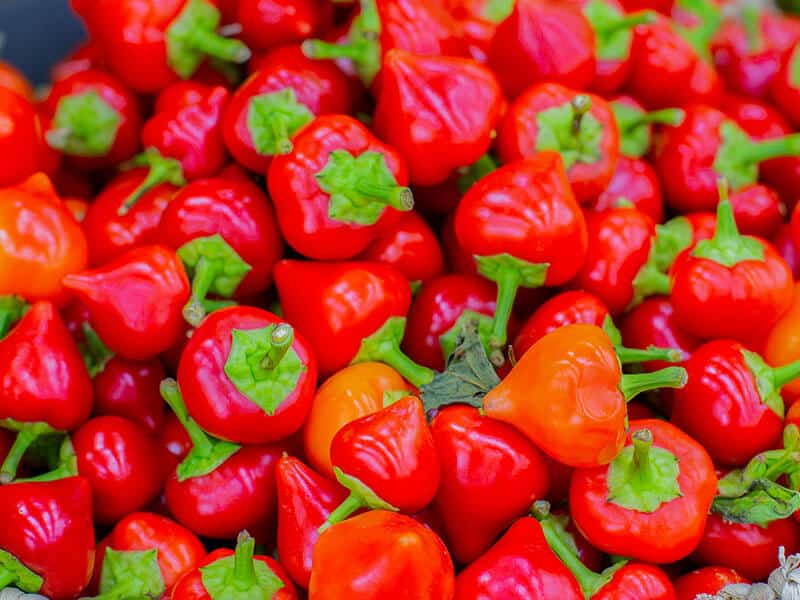
As briefly mentioned early, pimento (also spelled as “pimiento”) is a small, red, heart-shaped pepper with a subtle spicy taste and low heat level. Compared to other peppers, pimento is not as hot. Indeed, the spice is sweeter than the majority of different peppers.
Due to its bright red color and spherical, heart-shaped feature, this nightshade is sometimes known as a cherry pepper. It is typically between 3 and 4 inches in length and 2 to 3 inches in width, with a short, thick green stem.
Pimento is available in either fresh or ground form. Fresh pimento refers to dried, spherical berries, while ground pimento is paprika powder. During cooking, you may have to use one of the two forms above.
It is conceivable that you have eaten pimentos without realizing it. It is the primary component used in producing paprika (1) , a popular spice with a strong taste produced by grinding a variety of peppers to a fine powder. In some cases, people regard paprika as ground pimento.
Numerous cooks prefer the mild, sweet taste of paprika produced with pimentos over the heat imparted by other spices, such as cayenne pepper.
What Does Pimento Taste Like?
Mild and sweet are two distinct flavors I would label pimento. This spice guarantees not to cause any discomfort, even if you are unable to handle hot peppers.
It has a negligible Scoville heat rating of only 100 – 500 SHU (Scoville Heat Unit) (2) . If you compare the figure with a jalapeño pepper whose Scoville heat rating is 2,500 – 8,000, you will understand how mild pimento tastes.
Yet, adding even the tiniest bit of pimento to your meal would certainly do the job and make its subtle flavor highlighted. Its distinct sweet and somewhat spicy taste will always stick to your mind once you have tried the spice.
Incredible Pimento Health Benefits
Pimento has various health benefits that will definitely surprise you, thanks to its abundant content of vitamin C, A, B, K, iron, and potassium. Let’s discover the top four beneficial things that pimento can provide to your body.
1. Cancer Treatment
Researchers found that increasing vitamin C intake is associated with a decreased risk of developing cancer. Pimento peppers contain a significant quantity of vitamin C, making them a potent protector against virtually all types of cancer.
2. Skin Health Promotion
Another rich content found in pimento peppers is vitamin A, which is necessary for wound healing and skin regeneration. A lack of vitamin A will result in a poor complexion, as the nutrient helps combat acne and improve overall skin health.
Regular intake of pimento significantly prevents the formation of creases and wrinkles in the skin, thanks to the increasing collagen production responsible for maintaining youthful skin.
3. Proper Development
Copper is a mineral necessary for proper development and well-being. It is also a rich component in pimento peppers. Therefore, consuming pimento in enough amounts in your regular diet is essential.
It is not only healthy for your organs and tissue development but also effective in preventing abnormalities among children.
4. Blood Sugar Levels
Pimento peppers are superior in controlling blood sugar levels, owing to the presence of an adequate amount of manganese. This component also assists insulin production and secretion, avoiding the onset of illnesses such as diabetes.
Full Tutorial On How To Use Pimento Alternatives
Let me give you a complete guide on the exact ratio to replace pimento in your recipes. The following table not only provides you a brief instruction on how to use a majority of these substitutions.
| Substitutes | Ratios (Pimento/Substitutes) |
| Banana Peppers | Depending on your taste preferences |
| Canned Pimento | Follow instructions on the can |
| Cherry Peppers | 1 teaspoon of pimento = 1/2 teaspoon of cherry peppers |
| Corno Di Toro Peppers | Start with a small amount, and increase if needed |
| Holland Sweet Peppers | 1 teaspoon of pimento = 1 teaspoon of Holland sweet peppers |
| Italian Sweet Peppers | Depending on your taste preferences |
| Peppadew Peppers | 1 teaspoon of pimento = 1 teaspoon of Peppadew peppers |
| Piquillo Peppers | Depending on your taste buds |
| Red Bell Peppers | 1 teaspoon of pimento = 1-1.5 teaspoons of red bell peppers |
| Ancho Chile Powder | Begin with small amounts and build up from there |
| Apple Pie Spice | Depending on your taste preferences |
| Black Ground Peppers | Begin with small amounts and build up from there |
| Cinnamon | Depending on your taste preferences |
| Five-Spice Powder | Begin with small amounts and build up from there |
| Ground Cayenne Peppers | 1 teaspoon of ground pimento = 1/2 – 1/3 teaspoon of ground cayenne peppers |
| Ground Cloves | 1 teaspoon of ground pimento = 1/2 teaspoon of ground cloves |
| Ground Nutmeg | 1 teaspoon of ground pimento = 1/2 teaspoon of ground nutmeg |
| Mixed Spice | Depending on your taste buds |
| Pumpkin Pie Spice | Using just a sprinkle to avoid overpowering the recipe |
| Red Pepper Flakes | Depending on your taste preferences |
| Star Anise | Use a less amount than required by the recipes |
Note: You can adjust the ratios above to fit your taste preferences or your recipes.
20+ Surprisingly Simple Alternatives Of Pimento
The following list of pimento replacements will surprise you as it contains all popular and widely available peppers and spices. Go for one of them to add a similar taste profile to your delectable dishes.
1. Banana Peppers
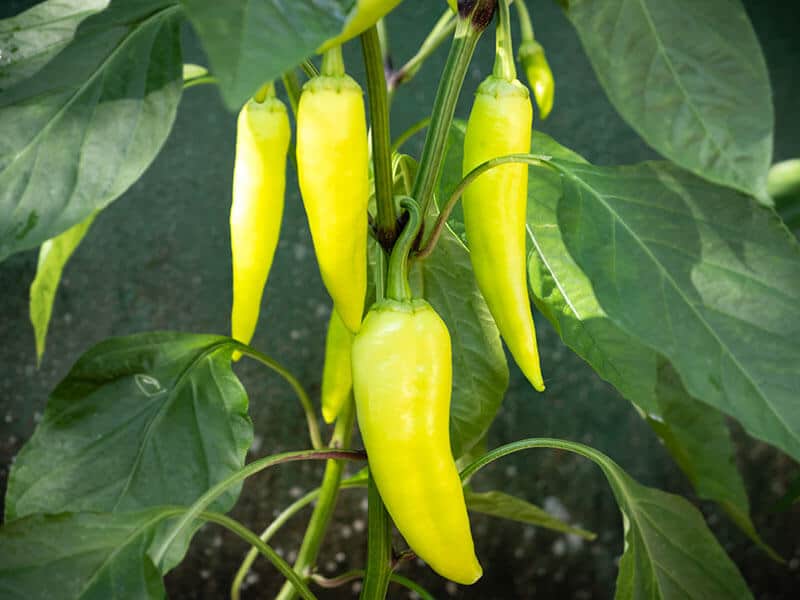
Also known as yellow wax pepper, banana pepper is a medium-sized chili pepper with a mellow and sweet flavor that complements a plethora of dishes. Besides the usual bright yellow color, this spice may become green, red, or even orange as they mature.
Like pimento, banana pepper has a mild taste with a similar range of 0 – 500 Scoville Heating Units. It is five times milder than the mildest jalapeno pepper. Therefore, the spice is not classified as hot pepper since it barely contains any heat.
Thanks to this particular feature, cooks regard banana pepper as a perfect alternative to pimento. It ticks every box, from a similar size to an almost identical aroma. Use a suitable amount of banana peppers to fit your taste preferences.
Banana pepper is often pickled, stuffed, or used fresh in various dishes. You will often find this spice served as a topping for pizzas, sandwiches; or as a filling alongside meat and cheese in other meals. Nowadays, it is easy to get jarred banana peppers at supermarkets.
2. Canned Pimento
If fresh pimento is currently unavailable to be found in your cupboard, canned or jarred pimento may come in handy. Indeed, this product is the most convenient and closest substitute for fresh pimento peppers.
It will be a win-win situation for you to utilize this canned version as it contains sliced, chopped, or even diced pimento, making your cooking more straightforward than ever. However, you need to know that canned pimento is rich in sodium due to the fact that it is marinated in sea salt.
Yet, rest assured that canned pimento is completely safe for your health. It is low in calories and fat, allowing you to prepare more healthy meals for your family. Follow the instructions on your can to have an ideal amount for your dishes.
You can find canned or jarred pimento readily available at grocery shops and supermarkets at a reasonable price. Use canned pimiento in the same manner as you would fresh pimiento. It will provide comparable effects and the same incredible taste that fresh pimiento imparts to meals.
3. Cherry Peppers
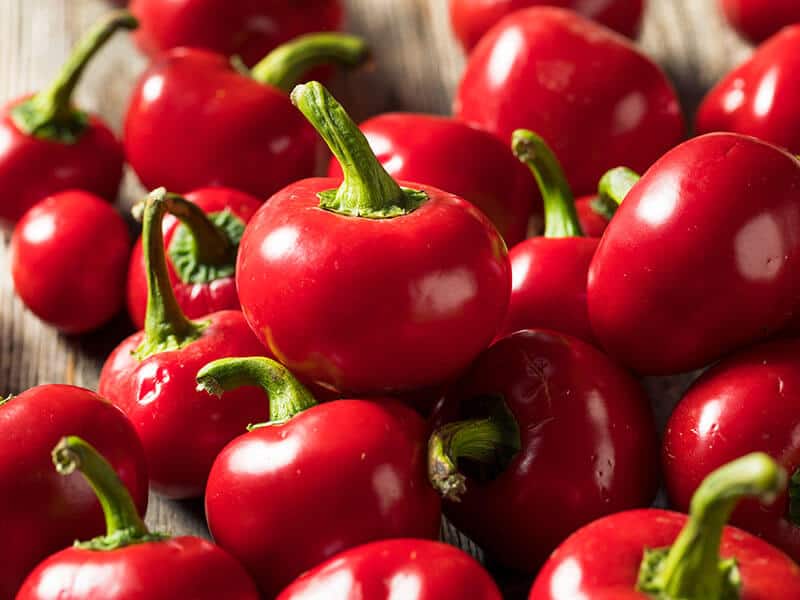
Due to their similar look and usage, cherry peppers are often mistaken for pimentos. The latter is much less hot and sweeter than the former. Plus, pimentos are heart-shaped, while cherry peppers are spherical. Yet, both spices have a similar taste and can be used interchangeably.
Don’t let the name “cherry” fool you into thinking that this pepper is a sweet type of Capsicum Annuum. On the contrary, it does have a spicy character with a Scoville rating of 2,500 to 5,000, winning it a place just below jalapenos.
Cherry pepper’s heat level varies from mild to moderate, depending on the variety. While certain cherry peppers are more on the sweet side, others are more on the spicy side. However, the spice is still an excellent choice to play the role of pimento in your dishes.
People often use cherry peppers as a pickled condiment on sandwiches and atop salads. It is also brilliant to chop and toss it into an omelet or mix it with ground beef to provide a more sophisticated flavor profile and a subtle textural change to burgers or meatballs.
Buying cherry peppers is not as easy as other spices, as you cannot find them available in supermarkets. I highly suggest you go to gourmet or higher-end shops for this kind of product. Substitute 1/2 teaspoon of chopped cherry pepper for 1 teaspoon of pimento.
4. Corno Di Toro Peppers

Corno di Toro is a sweet pepper native to Italy featuring a long, 8-inch pod with a tapering form like a horn. This shape earned it the name Corno di Toro, which roughly translates as “bull’s horn”.
The pepper is fruit, sweet, and a great source of antioxidants. Like many other peppers, it is also rich in vitamin A and C. Adding it to your dish is highly beneficial for skin health.
This Italian spice is another succulent substitute for pimentos, thanks to its thick flesh and very little heat nature. You can either enjoy this pepper fresh or utilize it in various ways to elevate your dish’s flavor.
Not only ideal for stuffing and grilling at high temperatures, but Corno di Toro is also perfect for frying and sautéing. Employ an appropriate quantity of Corno di toro peppers to your meals, as long as it suits your taste buds.
Like pimento, you can grow this pepper type effortlessly at home. If you love the idea, do not hesitate to purchase its seeds and start your exciting journey right away!
5. Holland Sweet Peppers
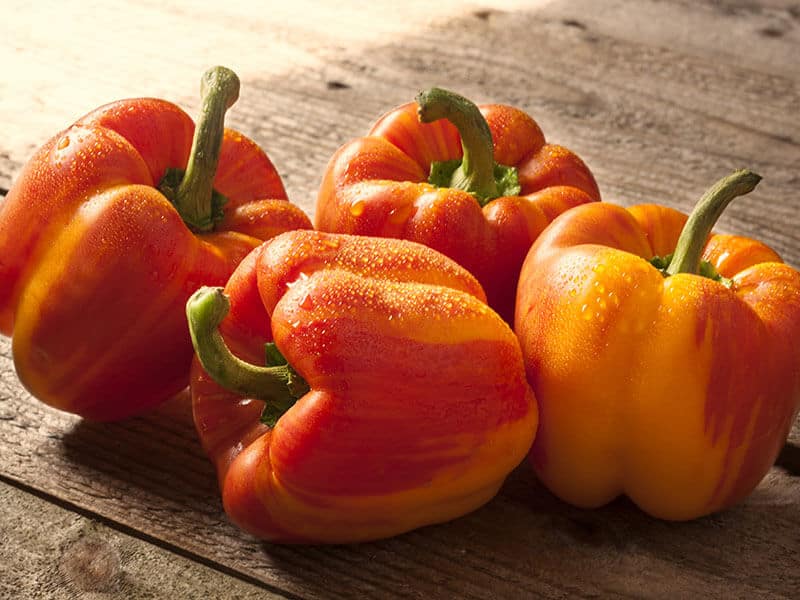
Like other sweet peppers, Holland sweet peppers (also known as Dutch chilies) may be used in place of pimento peppers in most cases.
This spice is characterized by its thick walls, consistent shapes, and a mildly sweet flavor. It comes in an array of vibrant colors, including red, orange, yellow, green, white, and even striped! A general rule of thumb is that the lighter the color is, the sweeter the pepper tastes.
Thanks to its near-perfect size and form, Holland sweet pepper is excellent for stuffing with various meat, seafood, and fruit salads. The thick walls also make it ideal for grilling and roasting. Substitute 1 teaspoon of Holland sweet pepper for every teaspoon of pimento.
6. Italian Sweet Peppers
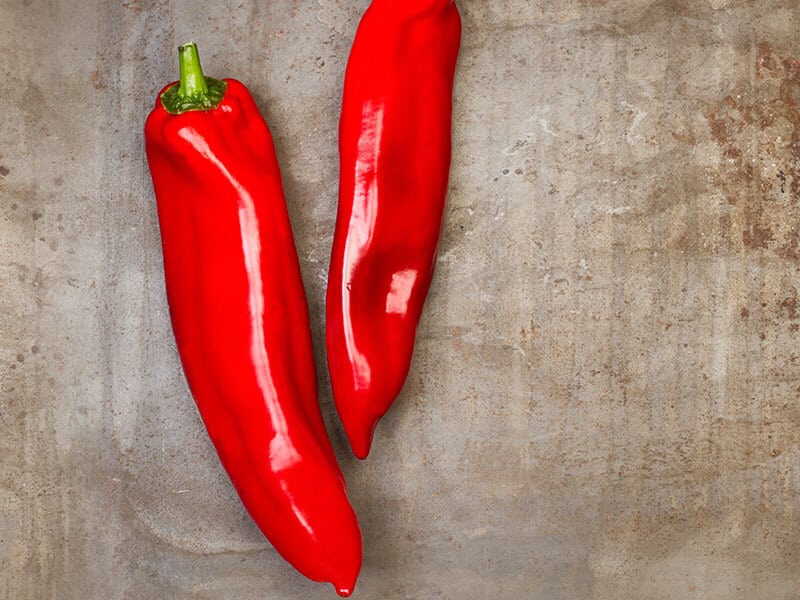
Italian sweet peppers, which are normally long and conical in form, are a popular chile pepper often found in Bel Paese cuisine. Often referred to as frying peppers, these Italian sweet peppers are sweet and meaty, making them a cannot-be-better plan B for pimentos.
You will extract their maximum nutritional advantages by sautéing in olive oil or mixing with a variety of dishes, including pasta, pizza, and salad greens. Their somewhat sweet flavor matches what pimentos do to your meals, which infuses your food with a subtle taste.
Play around with how many Italian sweet peppers you put in your recipes to find out the optimal quantity for replacing pimento. The number priority is to satisfy your taste preferences.
7. Peppadew Peppers
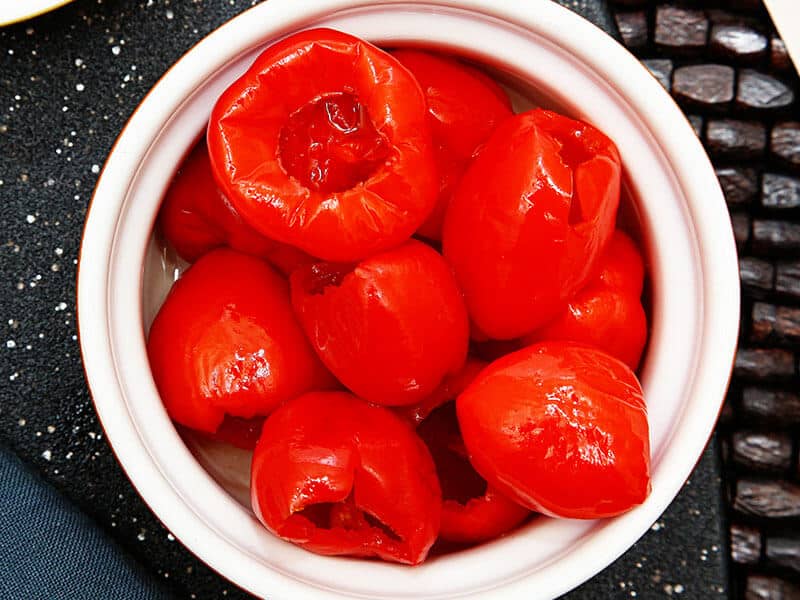
Peppadew is actually the brand name of piquanté peppers native to South Africa. It has a sweet and mildly spicy taste profile, which is an excellent complement to your foods. You can find Peppadew peppers available in both fresh and jarred form.
This distinct profile makes this pepper type a wonderful replacement for pimento, especially in baking and stuffing dishes. Or, feel free to cut Peppadew peppers finely and serve them atop toasted baguette pieces.
Substitute 1 teaspoon of fresh Peppadew peppers for 1 teaspoon of pimento for the closest flavor render.
8. Piquillo Peppers
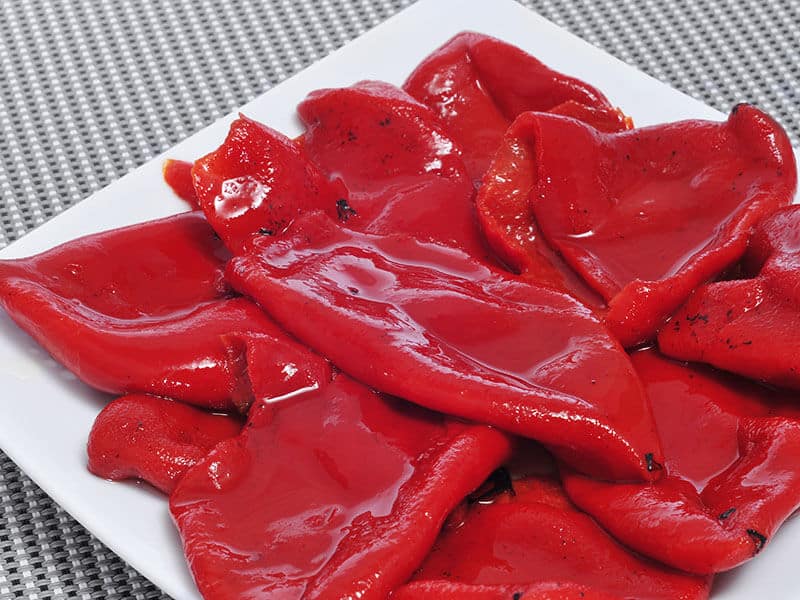
With 500 – 1,000 SHU, piquillo is a mild chili pepper native to Spain, particularly Lodosa. It is luscious and somewhat spicy with a tangy, smoky undertone. If you eat it fresh, you can feel a pleasant crunch due to its large walls, which are similar to bell peppers.
The imperceptible heat of piquillo pepper earns it the fittest profile to be a pimento substitute. Plus, it is big, delicious, and readily produced at home, which is everything akin to pimento. The best replacement amount of piquillo peppers is the one that fits your appetite.
There are various ways you can play with piquillos, from pickling, filling to roasting and even frying. This pepper is not only well-suited for stuffing but also for tossing into soups and sauces, owing to its size and texture. Let’s buy canned grilled piquillo peppers right away!
You can see this video to know more:
9. Red Bell Peppers
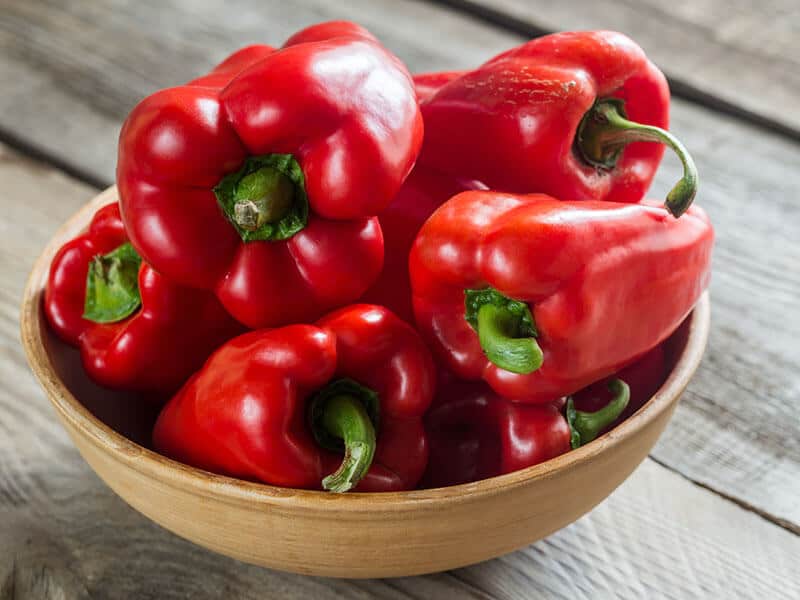
In the vast world of peppers, red bell is undoubtedly the most widely available kind in every household. It is also the finest alternative for fresh pimento pepper, thanks to its meaty texture and mild flavor.
However, there is one thing that red bell peppers do better than pimentos: they are always ready at supermarkets and grocery shops near your house.
Combining red bell peppers with piquillo peppers and roasting the marinated mixture yields a wonderful addition to various meals. The mixture offers a succulent hint of pickled taste, elevating your dish to a whole new level.
Use 2-3 teaspoons of fresh chopped red bell peppers for every 2 teaspoons of pimento.
10. Ancho Chile Powder
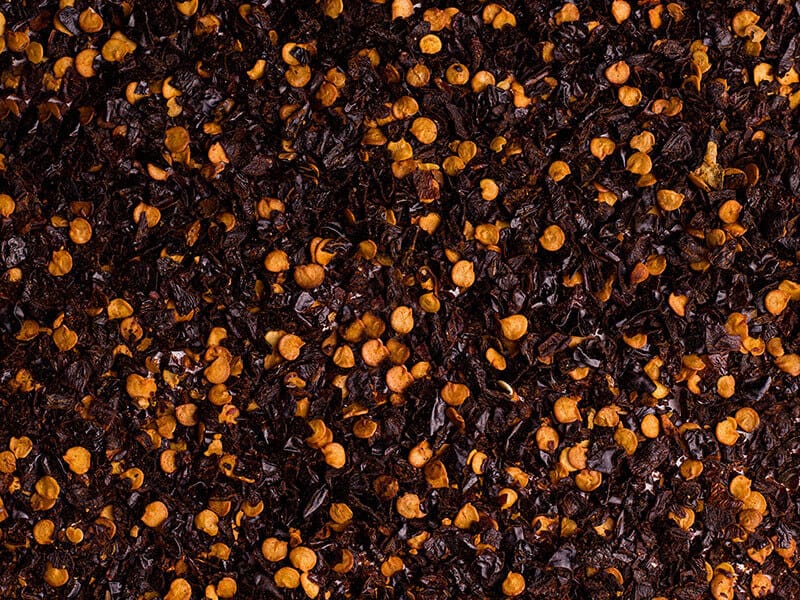
Ancho chile powder is dried matured poblano pepper in essence that infuses a smoky and spicy kick to various Mexican dishes like soups, salad dressings, and marinades. Its heat level is moderate, with 1,000 – 2,000 SHU.
Don’t mistake ancho chile powder with chili powder. The former contains one item only, dried poblano pepper, while the latter is a mixture of various ground spices (such as chilies, garlic powder, paprika, and cayenne pepper).
You will have no regret substituting ancho chile powder for ground pimento. Although it has a bit of higher heat, the spice will ultimately add the genuine Mexican flavor to your dish, similar to what pimentos do to your meals.
Since this replacement is in powder form, you can easily begin with a small amount and build up from there until you reach your desired taste.
11. Apple Pie Spice
Another potential option for replacing pimentos is apple pie spice, a delectably festive spice mix that pairs well with any fall-inspired baking dessert. This cozy spice mix comprises cinnamon, ginger, nutmeg, and cardamom, guaranteeing a soothing taste profile for your dishes.
You can generate a homemade version of apple pie spice effortlessly or choose to purchase a canned item at various supermarkets.
As soon as the weather becomes crisp and the leaves begin to change colors, it is high time to enter full-on autumn baking mode by using apple pie spice in place for pimentos. Choose the amount of apple pie spice that renders the perfect flavor to your taste buds.
12. Black Ground Peppers
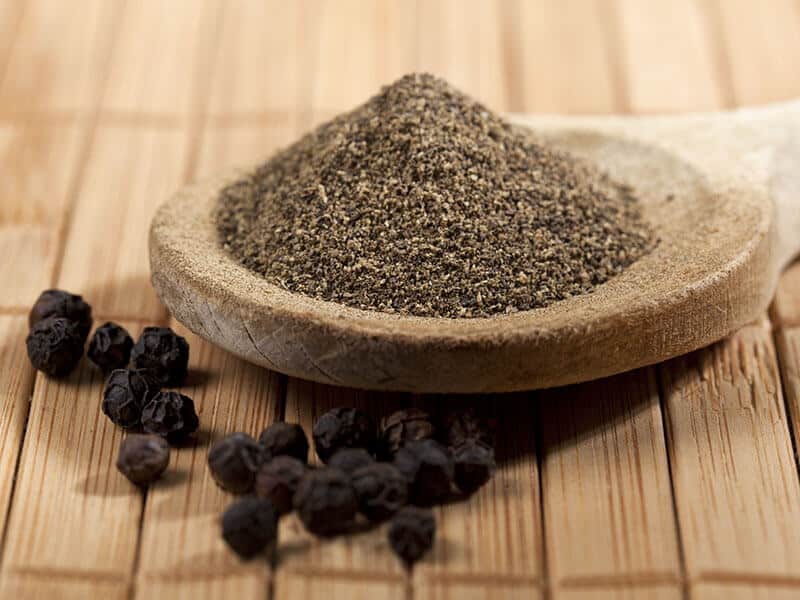
Among all pimento replacements, black ground peppers are properly the simplest option, as they are one of the most widely used spices across the globe. With a high-quality spice grinder, you can generate black ground peppers with a slightly spicy taste that complements various foods.
Their taste profile resembles what pimentos bring to your plates. A sprinkle of black ground peppers adds a hint of heat and pungent flavor. Thus, cooks prefer using black ground peppers when they don’t have enough pimentos on hand at the moment.
Like ancho chile powder, apply a small number of black ground peppers at first, then taste and adjust the amount until you feel the optimal aroma in your mouth.
13. Cinnamon
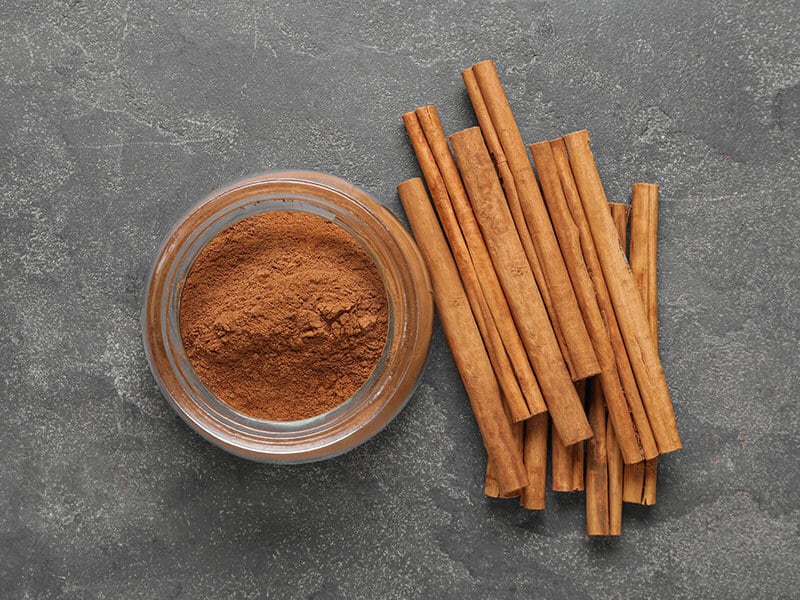
With a strong scent and pungent aroma, cinnamon is a brilliant idea to use in lieu of ground pimento in various dishes. This spice is both fragrant and flavorful.
This ubiquitous spice is a staple in the majority of kitchens. Cinnamon is delicious in hearty oatmeals and adds a distinctive touch to savory foods. Its warm and slightly spicy flavor complements a wide range of cuisines.
Whether sprinkled on top of a steaming pumpkin spice latte, included as a curl of bark into a hot cider, or incorporated into a newly baked apple pie, cinnamon evokes a sense of nostalgia and luxury that few other spices can equal.
Depending on your taste preferences, you can employ the best replacement ratio for cinnamon in your dishes.
14. Five-Spice Powder
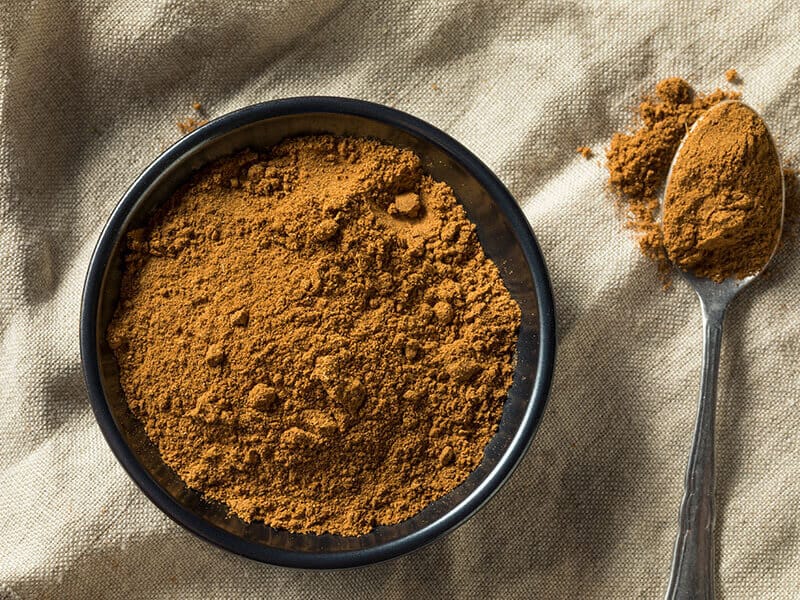
Five-spice powder is a great option to use in place of pimento in a plethora of savory dishes, thanks to the comparable spicy-sweet taste. As per the name, this China-originated spice incorporates five distinct ingredients of cinnamon, star anise, fennel, cloves, and peppercorns.
The five-spice powder may be used in a variety of ways. It is used in Chinese and Taiwanese cuisine to flavor stewed meats and poultry act as a spice rub for roasted dishes or season breading for fried foods.
Add this well-known Chinese spice blend to your pantry, and you are likely to discover a variety of its applications. Five-spice powder is the shortcut for achieving its distinctive taste.
When substituting, begin with a small amount and taste. Add more five-spice powder until you feel your favorite flavor in the meals.
15. Ground Cayenne Peppers
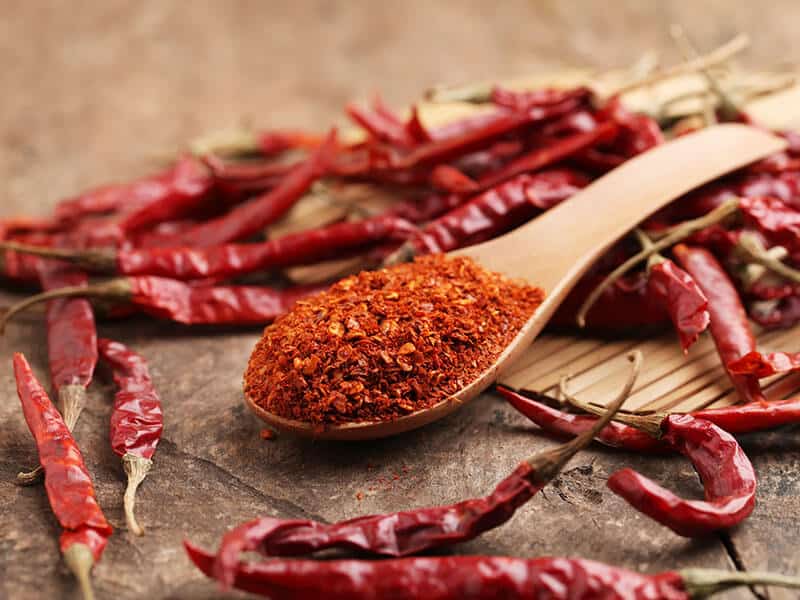
Not only regarded as the king of therapeutic plants, but cayenne peppers are also excellent for cooking and contain various useful elements. The spice in powder form makes the perfect alternative for ground pimento.
Cayenne peppers are a member of the nightshade family of flowering plants that includes bell peppers and jalapenos. Thus, cayenne possesses a moderately spicy level. Indeed, the spice ranks quite high on the Scoville scale.
You must have encountered ground cayenne peppers when enjoying pizza at nearby restaurants. The powder is also popular in various soups and sauces. Certain store-bought alfredo sauces also have ground cayenne peppers in their components.
Substitute 1/2 – 1/3 teaspoon of ground cayenne pepper to 1 teaspoon of ground pimento.
Learn to make cayenne peppers right in your kitchen with this tutorial.
16. Ground Cloves
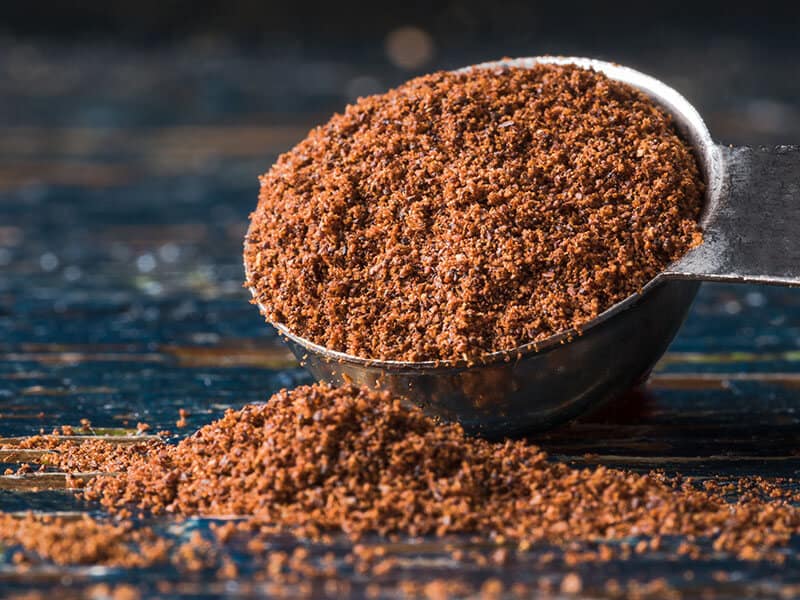
Ground cloves are the finest spice to add to any dish calling for pimentos. These powdered cloves provide the necessary sharp taste and sweetness to the majority of recipes. Feel free to garnish the spice in sweet baked products or toss it in savory recipes like curries and stews.
Try to incorporate ground cloves in your meal to experience all their amazing effects. You can even add them to drinks like mulled cider to infuse a distinctive aroma to your beverages. Replace 1 teaspoon of ground cloves with 2 teaspoons of ground pimento.
17. Ground Nutmeg
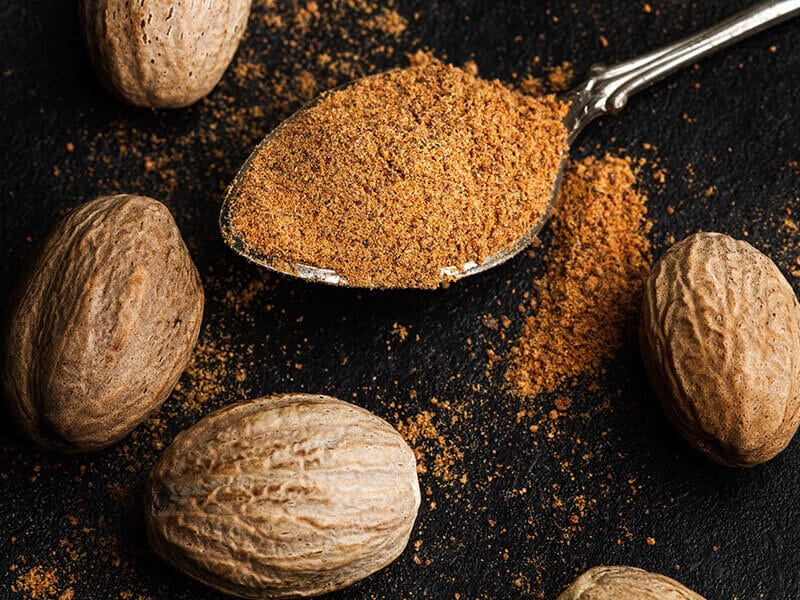
If you have been cooking for a while, you are probably aware that nutmeg is one of the most versatile spices available. Having said that, the ground spice is well-suited for use in lieu of pimento if you are looking for a comparable fragrance or taste.
Like gloves, ground nutmeg is a warming spice with a very mild peppery flavor. It is also applied in a variety of applications. Yet, depending on the type of dish, you may want to combine ground nutmeg with other spices to improve the results.
In detail, for sweet dishes, it is a good practice to mix ground nutmeg with a hint of cinnamon or apple juice. On the other hand, savory meals become better when you accompany ground nutmeg with cloves.
Substitute 1/2 teaspoon of ground nutmeg for every teaspoon of ground pimentos.
18. Mixed Spice
People often mistake mixed spice with pumpkin pie spice due to their similarity in the components used. Mixed spice is a blend of nutmeg, cloves, and cinnamon that imparts a moderate spiciness and sweetness, making it ideal for replacing pimento in many cases.
You can add mixed spice to any dish that requires pimento. It will not only pull off the substitute task successfully but also infuse a slight flavor of pumpkin pie spice into your meals. Consider your appetite to add the optimal amount of mixed spice to your recipes.
People often mistake mixed spice with pumpkin pie spice, due to their similar taste and components used.
19. Pumpkin Pie Spice
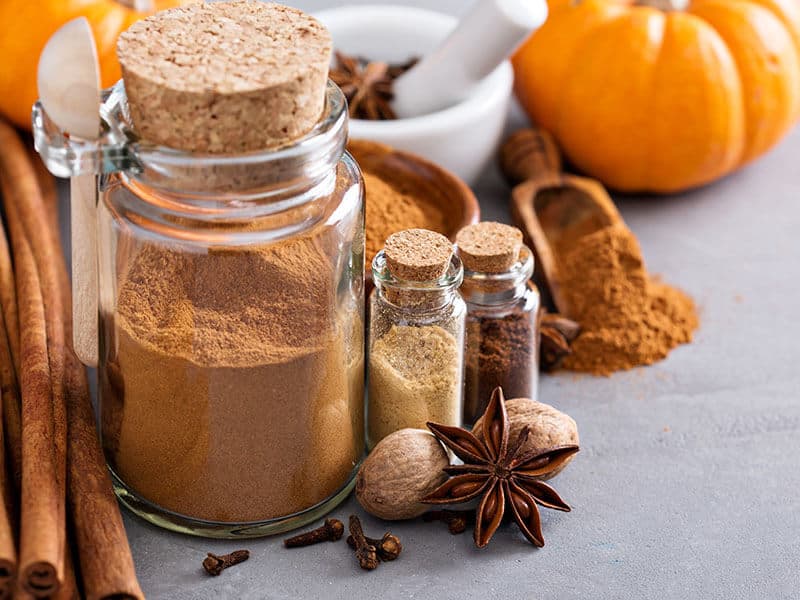
Pumpkin pie spice is a special alternative solution for pimento as one of its components is exactly pimento. In specific, pumpkin pie spice is a mixture of pimento and other warming spices such as cinnamon, nutmeg, ginger, and cloves.
This spice is often associated with baked products and various savory dishes requiring pimento, including chili, stews, and rubs. However, use pumpkin pie spice sparingly as it may quickly overpower your meal. I recommend using just a sprinkle of the spice for the greatest effect!
20. Red Pepper Flakes
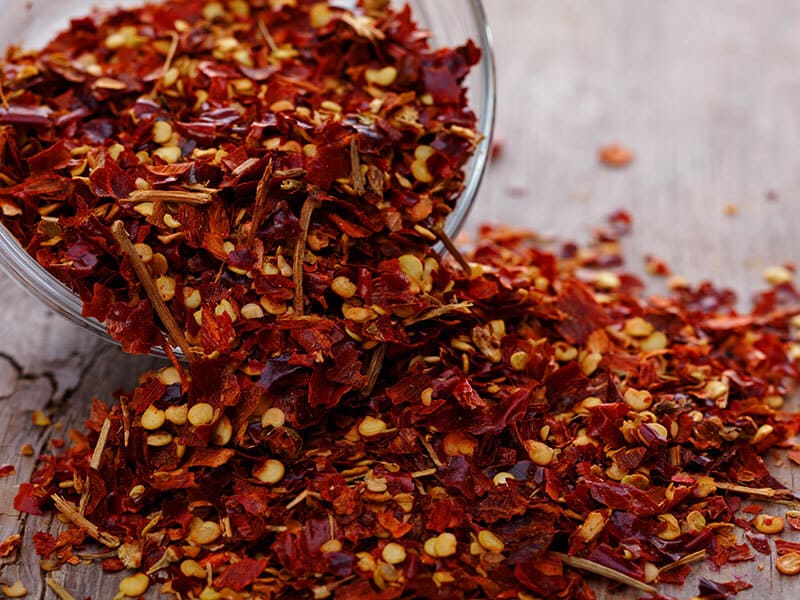
In almost every pizza shop throughout the country, you will discover a little glass jar filled with crushed red pepper. Yes, crushed red pepper is just another way of calling “red pepper flake”, another delicious substitute for pimento in any dish.
Red pepper flakes include a blend of different peppers, with cayenne pepper accounting for the lion’s share. Unlike chile flakes which consist of a single type of pepper, red pepper flakes have a more multi-dimensional taste profile. Yet, their main function is to generate heat.
This spice is popular everywhere. It complements nicely with pasta dishes and is the focal point of every pizzeria’s table. The amount of red pepper flakes employed in your dishes depends on your taste buds.
21. Star Anise
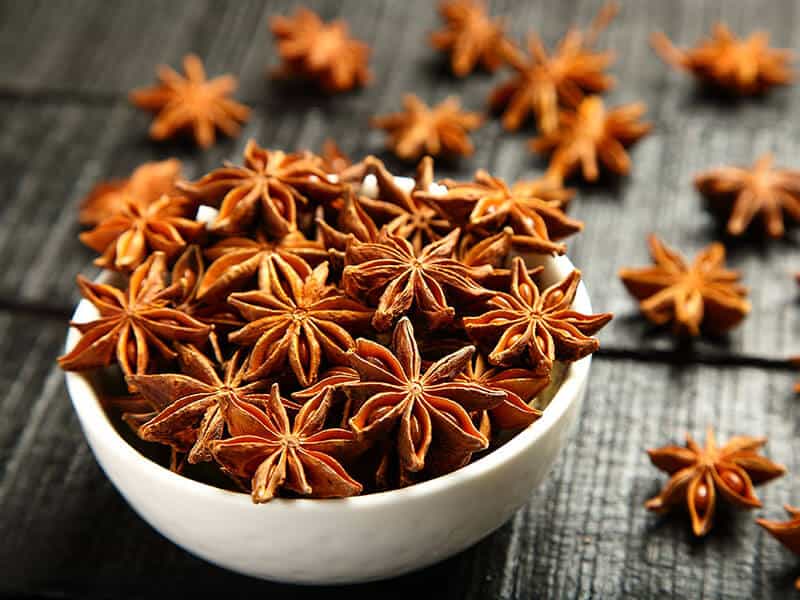
If you want to infuse your dishes with a powerful taste but cannot locate pimento in your cupboard at the moment, you can count on star anise. The spice possesses a strong and pungent taste, assuring the equivalent flavor to ground pimento.
The strong and licorice-like taste of star anise is suitable for curries, stews, and marinades. These star-shaped pods are also visually appealing, making them more enticing to explore in your culinary arsenal.
Since star anise possesses a more pungent taste than pimento, consider using less star anise than the amount of pimento stated in the recipes.
You can see this video to know more:
FAQs
I dedicate this section to answering all common questions related to pimento and its alternatives. Have a look, and may you find the information you are looking for.
What Is Your Favorite “Plan B” For Pimento?
Finding a proper pimento substitute is challenging. The difficult part lies in the distinct sweet and mildly spicy flavor that pimento exerts. Thus, to render such a subtle profile with an alternative is simply not easy.
However, the task is not impossible with the 20+ options I have compiled for you above. They are all qualified spices that you can rely on as a “plan B” in case you run out of pimento. Although some materials might have higher heat, their tastes are very similar to that of pimento.
What do you think about this list? Have you tried any alternative option before? Make sure to comment your thoughts below so that other readers and I can get a more objective view. And don’t forget to check out other useful articles on my site! Thanks for reading!
References
- Theepicentre.com.. Paprika.
- Pepperscale.com.. Pimento Pepper.




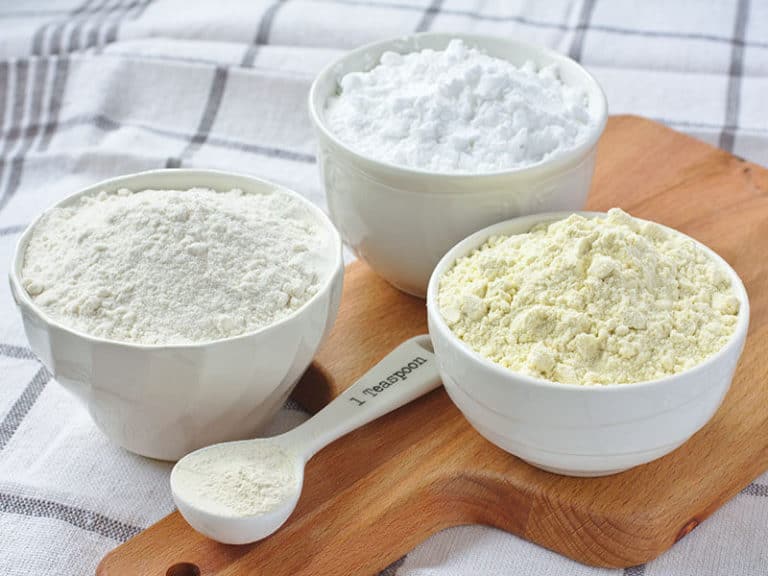

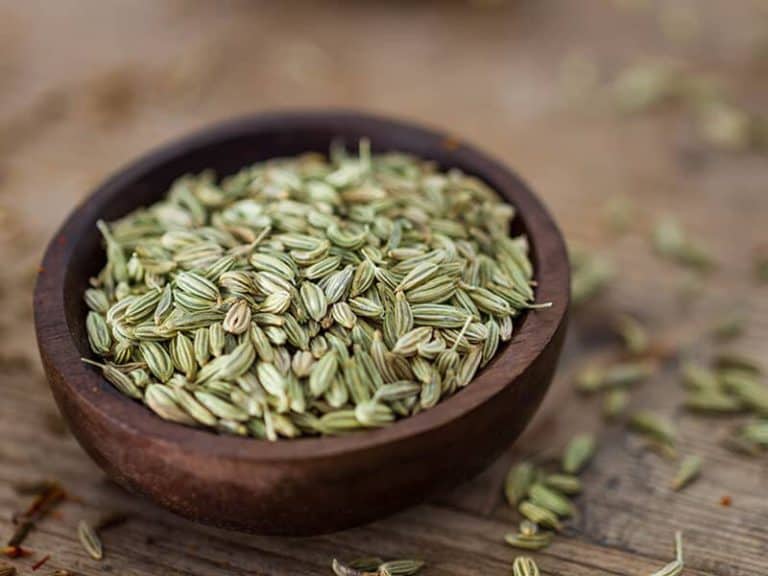

Amanda Collins
Founder and Senior Culinary Editor
Expertise
Culinary Arts and Management, Food Journalism and Critique, Recipe Development and Testing, Global Culinary Traditions, Sustainable Food Practices
Education
Institute of Culinary Education (ICE), New York, NY
Program: Diploma in Culinary Arts
Focus: Intensive hands-on training in culinary techniques, recipe development, and kitchen management, preparing students for professional roles in the culinary industry.
Monroe College, New Rochelle, NY
Program: Associate in Applied Science in Culinary Arts
Focus: Practical culinary skills, including cooking techniques, menu planning, and kitchen operations, with an emphasis on hands-on experience and industry standards.
Amanda Collins is a seasoned chef and food editor with a deep love for global flavors. Trained at the Institute of Culinary Education and Monroe College, and with over 15 years in the culinary field, Amanda has refined her skills in kitchens worldwide. Her background in food studies gives her a unique ability to share both recipes and the cultural stories that shape them.
As senior culinary editor at thebreslin.com, Amanda’s work brings authentic dishes to life, inviting readers to explore new flavors and techniques from around the globe. Her approachable style makes it easy for anyone to bring a bit of the world’s cuisine into their kitchen.